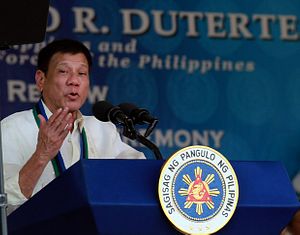Even as it endeavors to unite allies in the South China Sea amidst heightened tensions, the United States has hit upon a roadblock. And it comes from the unlikeliest of quarters – the Philippines.
After a campaign strewn with outlandish comments and violent promises directed against criminals and drug smugglers, Rodrigo Duterte was elected president earlier this year. Duterte ran for office on the back of his almost cowboy-like mayoral rule of the city of Davao, where infamous vigilante squads often perpetrated alleged extra-judicial killings. Human rights groups claim that these “death squads” have killed at least 1,400 people in Duterte-ruled Davao since 1998. And Duterte has lived up to his reputation as president: according to one Reuters report, about 900 suspected drug criminals have been killed in police operations since July this year, and a further 1,500 have been classified as “deaths under investigation.”
Duterte does not take kindly to international concern about his policies. Earlier this year, the Philippine president was involved in an ugly spat with UN Secretary General Ban Ki-moon, after the latter condemned Duterte’s comments on killings of journalists. Now it seems that Duterte has trained his guns on U.S. President Barack Obama himself. When asked for his response to Obama’s anticipated rebuke of his government, Duterte slandered the president, prompting a swift cancellation of bilateral talks between the two this week.
The timing of Duterte’s invective couldn’t have been more bizarre. Obama is on a landmark visit to South East Asia, just months after an international tribunal ruled in favor of the Philippines in its dispute with China over the South China Sea. The underlining agenda of Obama’s visit is to strengthen cooperation with U.S. allies in the region – ironically, with the Philippines in particular – in the face of China’s open disregard for the July ruling. Now, Obama has had to cancel one of his most significant meetings on the issue.
Duterte has since apologized for his language, but the Philippine president is unlikely to change his controversial anti-crime strategy at home. That is bad news for the United States: in many ways, Duterte is now becoming Washington’s Erdogan in Southeast Asia. Following a botched coup attempt in July this year, the Turkish president proceeded to fire thousands from the police, military, and other governmental departments – many of whom were seen as being political rivals. The United States was faced with a moral dilemma in partnering with Erdogan – most crucially, at a time of great need.
Duterte now poses the same questions to Washington, even as the geopolitical fire gets wilder in the South China Sea. The Philippines is America’s closest defense ally in the region, and Washington has a significant mutual defense treaty with Manila. Yet if Duterte continues his extra-legal crackdown on suspected criminals in the country, the spat between the two presidents is unlikely to abate.
Worse for Washington, some analysts already sense a shift in the Philippines’ China policy under Duterte. Writing in the Straits Times, Richard Heydarian, a Manila-based political scientist, said that “the Philippines has rapidly transformed from the leading China hawk in Southeast Asia into one of the most proactive proponents of constructive engagement with the Asian juggernaut.” Duterte has actively advocated bilateral dialogue with China, Heydarian wrote, even in the context of this year’s South China Sea ruling – a far cry from the more proactively confrontational approach followed by his predecessor Benigno Aquino III.
And it doesn’t end there; Duterte has even challenged the Philippines’ long-standing defense treaty with the United States. Shortly after his landslide presidential win, Duterte said, “I will be charting a [new] course [for the Philippines] on its own and will not be dependent on the United States.” On the campaign trail, Duterte ran into another ugly row with the U.S. Ambassador Philip Goldberg and accused him of “meddling.”
America’s quarrels with a key Southeast Asian ally couldn’t have come at a better time for China. Beijing has been sure to make the most of it, with promises of heavy investment in the Philippines’ infrastructure. In June this year, Duterte said that Chinese diplomats had offered to build a key railway line in the northern part of the country, apart from promising investment in Duterte’s own home province in the south.
Duterte may well be radically changing the political dynamics in the South China Sea. For Washington, seeking to take the initiative after the arbitration ruling, this shift couldn’t havecome at a worse time.
Mohamed Zeeshan is a student of international affairs at Columbia University and a foreign affairs columnist for The National Interest, HuffPost India, and DailyO among others

































